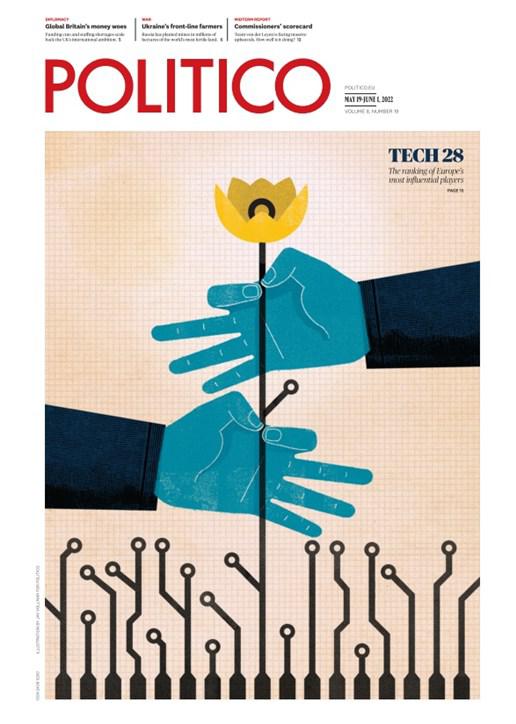Press play to listen to this article
Voiced by Amazon Polly
Presented by Coalition for App Fairness.
By MARK SCOTT
PRESENTED BY
Send tips here | Subscribe for free | View in your browser
ANOTHER WEEK, ANOTHER DIGITAL BRIDGE. I’m Mark Scott, POLITICO’s chief technology correspondent. If you just can’t get enough of the EU-U.S. Trade and Tech Council, I’ll be doing a post-game debrief today at 10 a.m. ET / 4 p.m. CET with Tarun Chhabra from the White House’s National Security Council and Alejandro Cainzos from the cabinet of Margrethe Vestager, the European Commission executive vice president. Watch along here — and don’t forget to ask questions.
It’s a somber one this week:
— A fatal shooting in New York State again shows how online extremism is running rampant.
— The world’s great-and-the-good are meeting in Davos. What’s on the digital agenda, and should you care?
— Just what we all need right now: confusion and uncertainty caused by the ongoing global digital tax overhaul.
**A message from Coalition for App Fairness: The Digital Markets Act is a substantial win for consumers, developers of all sizes, and everyone who wants a free and fair digital marketplace. Learn how the DMA benefits competition, innovation, and consumers by creating an open app store ecosystem here.**
WHITE SUPREMACISM, GREAT REPLACEMENT THEORY AND ONLINE EXTREMISM
IT HAPPENED AGAIN. On Saturday, an 18-year-old carrying an assault weapon emblazoned with racist language entered a supermarket in a predominantly African-American neighborhood in upstate New York. The man killed 10 people and left another three with non-life threatening injuries, livestreaming his actions via Twitch, the Amazon-owned gaming platform. He posted a manifesto online, with repeated references to the so-called “Great Replacement Theory,” a misguided belief that people of color are replacing the white population across the West. That theory dates back to the writings of Renaud Camus, a French philosopher, in 2011.
If this all sounds familiar, it’s because it has happened before. The Christchurch massacre in 2019. The Charleston Church shooting in 2015. The Oslo killings in 2011. There is a growing subculture of predominantly young, white men in the European Union and United States that have become radicalized through a combination of online, fringe message boards and social networks; disquiet about how the world is changing around them; and, most important, a dystopian view the Great Replacement Theory provides an answer.
“It speaks to two facets of what we see in rightwing extremism. On the one hand, what we call a mainstreaming dynamic, which is the extent to which hard-right talking points get parroted, both in the political mainstream and mainstream media,” Jacob Davey, an analyst at the Institute for Strategic Dialogue, a think tank that tracks online extremism, who’s written extensively about the Great Replacement Theory, told me. “But it also speaks to the continued growth and solidification of a cohesive set of ideological talking points that underpin the global white supremacist scene.”
The attacker’s online manifesto, which was obtained by Digital Bridge, certainly had the hallmarks of this globalized far-right movement — one which encompasses everyone from German neo-nazis to U.S. militias. You have to take this with a pinch of salt, but he said his route to the white supremacist community began in the early stages of the global pandemic when he started “browsing 4Chan,” the fringe message board. He held up other white supremacist terror attacks as examples of what he was trying to accomplish. He praised users of the messaging platform Discord for helping him to nurture his ideology. It’s all nasty stuff.
It’s true these beliefs have increasingly gone mainstream. But it’s also naive to think certain rightwing influencers are the root cause of such violence. How many 18-year-olds, for instance, are routine watchers of Fox News pundits? Instead, the Buffalo massacre highlights something that COVID-19 has only fast-tracked. The emergence of a sophisticated, mostly-online community of angry white men fueled by violent online memes, bogus philosophies and an increasing willingness to do something about it.

The attacker also showed how pointless existing online content moderation actually is. Sure, his livestream was taken down pretty quickly from Twitch. But copies of the video garnered, collectively, hundreds of thousands of views on Facebook, YouTube, and Twitter before they, too, were removed. Screenshots of the massacre are all over 4Chan, 8Chan and other rightwing bastions — and I quickly found the full video on one of these sites. The terrorist even said, in his manifesto, he preferred to livestream on Twitch because, unlike Facebook, people wouldn’t need a log-in to watch it. Another benefit: Twitch videos could also be livestreamed on Discord. In short: he knew the best way to get his content out into the world.
Right now, neither the EU or U.S. has a response to this movement. It’s well-organized, decentralized, global and able to grab the latest global crisis (be it the Canadian trucker convoy or war in Ukraine) and weaponize it for its own political needs. It’s a phenomenon with its own language of memes and short-hands. It relies on fringe social media with little to no content policing. It’s often belittled as just a bunch of young white men stuck in their basements. What Buffalo again showed is that it should be taken seriously.
DAVOS’ DIGITAL AGENDA
THE WORLD ECONOMIC FORUM’S (WEF) annual meeting – more commonly known just as Davos — kicks off on Sunday after it was delayed earlier this year because of the COVID-19 pandemic. I have to be honest: I’m not a big fan. But the yearly event gives an insight into what topics are likely to dominate the (corporate) tech agenda over the next 12 months.
If the program is anything to go by, it’s going to a consultant’s dream of buzzwords. “Defining and building an open and inclusive metaverse.” “Helping governments and businesses address unprecedented security risks.” “Ensure that these (artificial intelligence) systems emphasize privacy and accountability.” Throw in some “Fourth Industrial Revolution” and “we need to leverage the blockchain” jargon, and Davos this year is lining up to be heavy on an optimist’s vision of how technology can alter the world for the better.
That means it’s mostly sidestepping the thorny regulatory issues that now confront everything from artificial intelligence and digital competition to efforts to digitize the Global South and reshuffle how we all work in this pseudo-post pandemic era. If you’re going to gather 2,000 of the, apparently, most important people to hash out topics like climate change and “better business,” whatever that is, you might as well spend some time on tricky digital issues that lie at the heart of many of these wider topics.
For one, an open discussion about using technology to combat global warning — and the necessary funds to make that work ahead of the next United Nations’ meeting in Egypt at the end of the year — would be a pretty good place to start. Almost $100 billion was invested in so-called “climate tech,” or startups working on technology to fight climate change, in the 12 months through June, 2021. How can those funds, which are still only 14 cents out of every $1 spent within venture capital, be expanded, particularly to middle-income countries?
Next up: digital governance. Yes, this is my particularly jam, so no surprises here. But if the recent EU-U.S. Trade and Tech Council meeting — alongside the White House’s Declaration for the Future of the Internet — showed anything, it was the need for the West to get its act together and present a unified commitment about how it wanted the internet to develop over the next 30 years. Working with partners like Australia, Japan South Africa and Brazil, to name a few, would be a good place to start.
One area I also would have liked to see more of at Davos is cryptocurrencies. Not the over-hyped growth of stablecoins or how central banks are on their way out. But how can policymakers, the financial markets and everyday citizens can rely on this new form of currency that has yet to find its feet as a legitimate financial instrument. It’s time to have a discussion on how to allow these decentralized networks to flourish while providing some form of necessary oversight.
The final topic, and I say this with a heavy dose of naivety, is whether meetings like Davos are even worth it, given the cultural, social and financial overhaul of the past two and a half years. The current digital landscape is dominated by many of those attending the upcoming event in Switzerland. The question I have is: are they the right people to be setting the agenda for the years to come?
BY THE NUMBERS
GLOBAL TAX PACT IN LIMBO
WHEN US TREASURY SECRETARY JANET YELLEN landed in Europe this week, she had a lot on her plate. Further sanctions against Russian oil was particularly high on the agenda. But buried in meetings, particularly those during her time in Poland, were renewed efforts to reach an agreement on the stuttering global deal to revamp the world’s tax rules. The goal of clinching this pact are fast unwinding. They include having the world’s 100 largest companies pay more tax where they operate and setting a global corporate minimum tax threshold of 15 percent. European finance ministers are expected to vote next week on setting a minimum tax rate, though Warsaw has said it won’t sign up unless the other part of the agreement, in which big firms are forced to pay out more to local governments, is equally squared away.
That part, however, is looking in serious doubt after the U.S. Senate showed little, if any, willingness to approve how many American companies would have to pay taxes worldwide. There’s even doubt that Congress would support the global minimum corporate tax threshold, given growing descent within both Democratic and Republican circles. If the Republicans regain either the House of Representatives or Senate (or both), the likeliness of Washington passing the needed treaties and legislation would become even more remote. Yellen and other U.S. officials know this. There’s just little they can do about it.
RESHAPING EUROPE’S DIGITAL FOREIGN POLICY
EUROPE LIKES TO SAY that it wants to be a global, digital regulatory superpower. But despite its world-setting data protection rules, as well as its recently-approved Digital Markets Act and Digital Services Act, Brussels punches way below its weight on the global stage compared to its rivals like Washington and Beijing. Many of the EU institutions vie for power between each other and often fail to take existing rules and turn them into potent international policy. I talked to José Ignacio Torreblanca, a senior policy fellow at the European Council on Foreign Relations, a think tank, about his work on creating a true digital foreign policy for the 27-country bloc. The goal: unify the bloc’s digital regulation, investment funds and tech expertise to help others around the world.
On targeting Europe’s digital foreign policy: “The ‘Brussels effect’ [Europe’s regulatory impact in other parts of the world] is there, but it’s something that happens by default. No one really looks through the places where you would want to have an impact and then take steps to make it happen. You just produce your legislation and then let it impact others. In some places, this may be good. But in some cases, you may be disrupting things.”
On how to make (and keep) friends: “If you want to be a regulatory superpower, let’s not just do it like the (EU’s) Common Agricultural Policy. You don’t want to screw everyone else with your regulations that they have to accept and you may destroy their markets. So this is our plea. Look at these things in a more comprehensive and strategic way, and you will be able to exploit a lot of opportunities that you are currently letting pass by.”
On priorities: “The first area is cyber. That’s very important because that’s a very good entry point for everyone. Then connectivity, which is related to security. The 5G debate is very important because that’s kind of a bundle. Once you pick one cherry from the 5G tree, all the other things start coming together because then you have to screen your investments.”
On how to make this happen: “The next step is to try and identify which members countries can be brought on board. It requires member states doing this for their own, self-enlightened interest. Also by seeing there are commercial interests that they can promote abroad, so this is not just a naive policy but also there’s a lot of money to be made.”
WONK OF THE WEEK
WE’RE GOING PRETTY MAINSTREAM this week to focus on Alvaro Bedoya, the recently-appointed commissioner at the U.S. Federal Trade Commission whose background in the world of privacy is likely going to be put to good use as the federal agency doubles down on its data protection enforcement role.
Bedoya was a controversial choice. The Harvard and Yale graduate is a well-known privacy advocate whose focus has centered on the potential misuses of facial recognition and other technologies. He was the founding director of Georgetown University’s Center on Privacy and Technology. He’ll be the third Democrat on the FTC’s five-person commission board, allowing the Lina Khan-led agency to push ahead with Biden’s agenda.
“We know very little about these systems. We don’t know how they impact privacy and civil liberties,” the Peruvian-born academic wrote in a co-authored paper about the abuses of facial recognition in 2016. “We don’t know how they address accuracy problems. And we don’t know how any of these systems — local, state, or federal — affect racial and ethnic minorities.”
THEY SAID WHAT, NOW?
“It definitely wasn’t any ‘China bashing.’ It was more about how can we work productively in the TTC. The U.S. and EU, together, strengthening our supply chains, working together to coordinate investments in semiconductors, working together to align on export controls to deny China critical emerging technology through export controls,” said Gina Raimondo, the U.S. Commerce Secretary when asked by reporters about the recent transatlantic get-together in Paris. “We’re really trying to move the TTC towards concrete outcomes that push our democratic agenda.”
WHAT I’M READING
— Europe still lags behind its international counterparts on innovation and digital skills, potentially hamstringing its efforts to become a global digital rule-maker, argue Laurence Boone, Jörg Haas, David Haugh, and Young-Hyun Shin for the Organization for Economic Cooperation and Development.
— The Kremlin and Russian state-backed media are using the facade of fact-checking to spread disinformation and distort the truth about the invasion of Ukraine, according to analysis from Ingrid Dickinson for the Atlantic Council’s Digital Forensics Lab.
— Companies and policymakers need to start thinking about how to insert ethics into the use cases for quantum computing before this emerging technology becomes even more developed, claims Mira Pijselman for Ernst & Young.
— Almost 20 percent of all Twitter accounts are either fake or spam accounts — far higher than the company’s stated figure of 5 percent of its accounts falling into these categories, based on work from SparkToro and Followerwonk.
— The U.S. Department of Justice and Equal Employment Opportunity Commission published guidance on how employers can use artificial intelligence, ethically, to avoid discriminating against those with disabilities. Read it here.
— What could U.S. federal privacy legislation look like, given the growing complex web of state-based rules and hot-button issues like private right to action? The R Street Institute, a Washington think tank, lays out a possible way forward.
**A message from Coalition for App Fairness: We encourage policymakers in the European Parliament and the Council of the EU to swiftly adopt the Digital Markets Act. The benefits of the legislation for the app store ecosystem, consumers and developers are significant. It will give consumers the freedom to choose how to access apps. It will ensure developers face a level playing field on mobile devices. Such provisions include allowing consumers to download apps directly from the Internet and third-party app stores free from discriminatory terms and enabling developers to offer the in-app payment options of their choice. The DMA is a model legislation for policymakers and regulators across the globe that are looking to create open and fair app ecosystems. More on how the DMA benefits the app store ecosystem here.**
SUBSCRIBE to the POLITICO newsletter family: Brussels Playbook | London Playbook | Playbook Paris | EU Confidential | Sunday Crunch | EU Influence | London Influence | Digital Bridge | China Direct | Berlin Bulletin | D.C. Playbook | All our POLITICO Pro policy morning newsletters
More from ...Mark Scott








